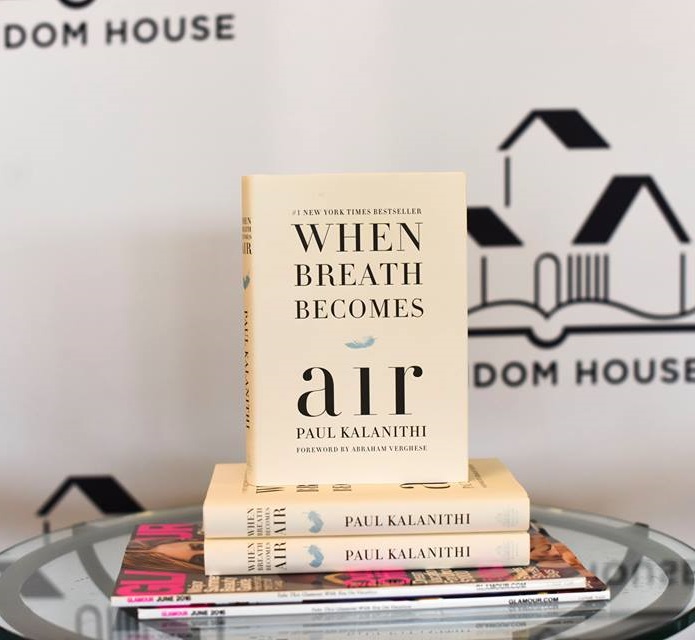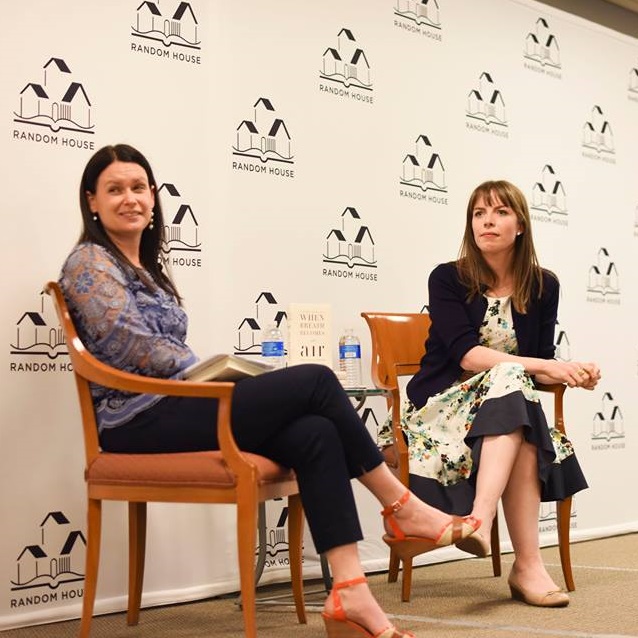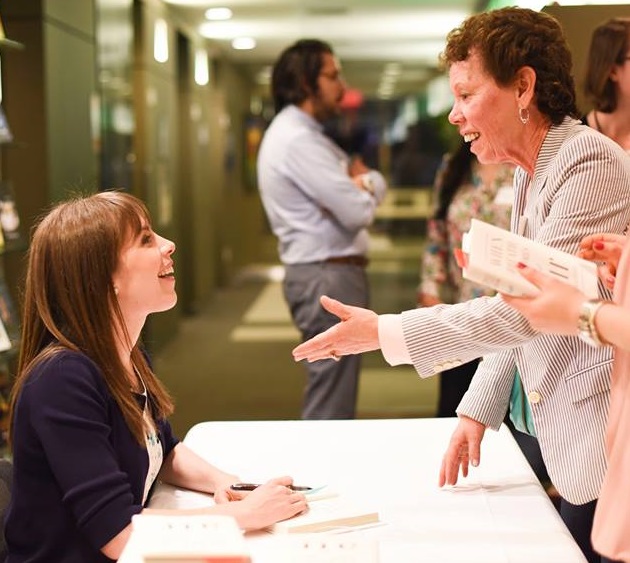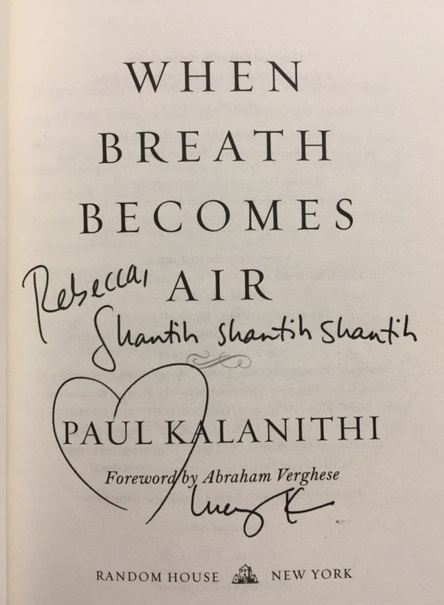 On Monday night, I had the pleasure of attending Random House’s seventh Big Ideas Night --- the latest in the series, which offers readers a forum for conversations between writers and editors of popular, recently released books. Monday’s event focused on WHEN BREATH BECOMES AIR, the New York Times bestselling book written by Paul Kalanithi, an award-winning neurosurgeon who was struck down at the height of his career by a devastating stage IV lung cancer diagnosis. As WHEN BREATH BECOMES AIR was released posthumously, Paul’s equally brilliant wife, Lucy, was our featured guest, along with Elisabeth Egan, author and books editor at Glamour magazine. As attendees enjoyed hors d’ouvres and sipped on wine, Lucy and Elisabeth discussed the process of guiding Paul’s words and ideas into the world to a packed house of 175 guests.
On Monday night, I had the pleasure of attending Random House’s seventh Big Ideas Night --- the latest in the series, which offers readers a forum for conversations between writers and editors of popular, recently released books. Monday’s event focused on WHEN BREATH BECOMES AIR, the New York Times bestselling book written by Paul Kalanithi, an award-winning neurosurgeon who was struck down at the height of his career by a devastating stage IV lung cancer diagnosis. As WHEN BREATH BECOMES AIR was released posthumously, Paul’s equally brilliant wife, Lucy, was our featured guest, along with Elisabeth Egan, author and books editor at Glamour magazine. As attendees enjoyed hors d’ouvres and sipped on wine, Lucy and Elisabeth discussed the process of guiding Paul’s words and ideas into the world to a packed house of 175 guests.
I read WHEN BREATH BECOMES AIR when it first released in January, not long after suffering the loss of a beloved family member myself, and I cannot begin to describe how deeply Paul’s words touched me. His brilliance and genuine love of life were absolutely captivating --- as was he, I imagine. As such, I expected Lucy to take the stage with the diminished brightness of a grieving spouse. Believe me when I say that I could not have been more wrong. From the moment Lucy arrived, she was bright, bubbly, gracious and, above all, unflinchingly honest.
 Elisabeth began their discussion by asking Lucy what the past four months have been like since the book’s publication. Although many of the audience members were familiar with Paul’s book, we were all surprised to learn that Monday marked 14 months to the day since Paul’s passing. Even with such a painful reminder, Lucy remained upbeat, remarking that Paul would have been absolutely thrilled by the reception of his book, both because of the conversations about medicine and life taking place and about joining the canon of literature. As an internist at Stanford University’s Clinical Excellence Research Center, Lucy is particularly amazed by the ways Paul has inspired so many patients to learn more about medicine and mortality.
Elisabeth began their discussion by asking Lucy what the past four months have been like since the book’s publication. Although many of the audience members were familiar with Paul’s book, we were all surprised to learn that Monday marked 14 months to the day since Paul’s passing. Even with such a painful reminder, Lucy remained upbeat, remarking that Paul would have been absolutely thrilled by the reception of his book, both because of the conversations about medicine and life taking place and about joining the canon of literature. As an internist at Stanford University’s Clinical Excellence Research Center, Lucy is particularly amazed by the ways Paul has inspired so many patients to learn more about medicine and mortality.
Long before the release of WHEN BREATH BECOMES AIR, Paul penned an op-ed for the New York Times called “How Long Have I Got Left?” The response to his article quickly launched him into the spotlight and nearly guaranteed that his future works would fly off the shelves. It was his Stanford Medicine article, “Before I Go,” however, that truly captivated readers, as it ended with a love letter to Paul’s daughter, Cady. According to Lucy, the reaction to this article was a tremendous boon to Paul’s health and happiness as the social media responses allowed him to feel as though he was still participating in the world, even when he could barely leave his room. It was incredible to see how important Paul’s readers were to him and how desperately he wanted his words to get out --- not for the want of fame, but for the need of sharing an important and oft-ignored narrative.
It may surprise many readers that, despite his scientific brain and knack for surgery, Paul originally wanted to be an English major and read voraciously throughout college. Writing came very naturally to him, but Lucy does not feel similarly. When Elisabeth asked Lucy what it was like writing the epilogue to WHEN BREATH BECOMES AIR and handling the final publication details, she laughed about her inabilities, quipping that “writing is like exercising for me in that I don’t like doing it, but once it’s done I feel proud.” When it came time to discuss the cover’s design, Lucy admitted that she was shocked that the Random House team could even understand her “meaningless” directions to make it “classic and timeless, stylish but not too trendy…and don’t forget to keep it masculine! Somehow,” she laughed, “it came back perfect.”
many readers that, despite his scientific brain and knack for surgery, Paul originally wanted to be an English major and read voraciously throughout college. Writing came very naturally to him, but Lucy does not feel similarly. When Elisabeth asked Lucy what it was like writing the epilogue to WHEN BREATH BECOMES AIR and handling the final publication details, she laughed about her inabilities, quipping that “writing is like exercising for me in that I don’t like doing it, but once it’s done I feel proud.” When it came time to discuss the cover’s design, Lucy admitted that she was shocked that the Random House team could even understand her “meaningless” directions to make it “classic and timeless, stylish but not too trendy…and don’t forget to keep it masculine! Somehow,” she laughed, “it came back perfect.”
After discussing the finer points of the book’s publication, Elisabeth turned the conversation towards grief and how Lucy handled her devastating loss. With supreme grace and poise, Lucy explained that the most important thing you can do for a loved one who is very ill is to sit with it. When Paul was nearing the end, he and Lucy knew enough not to feel angry, but they often cycled between anxiety and sadness. Going through these emotions together and using “I wish…” statements allowed them to really embrace their grief and journey through it, not as a husband and his soon-to-be widow, but as a couple. Although Lucy and Paul were careful to own their grief, she explained that it is equally important to keep things as normal as possible, as being sick is already an incredibly isolating experience and being alone only worsens the situation. Lucy also shared some advice from her mother: “When in doubt, describe.” In other words, it is better to show up at a sick friend’s bedside and say “I don’t know what to say, because you’re very sick and it’s scaring me that I don’t know what will happen,” than to not show up at all. I know I’ll definitely keep this advice in mind!
 Throughout WHEN BREATH BECOMES AIR, Paul is constantly mentioning books and poems he has read and the impacts they have made on him. Elisabeth ended her discussion by asking Lucy what she has read since Paul’s passing and what books have helped her the most. Lucy first mentioned FAR FROM THE TREE, a powerful book by Andrew Solomon about parenting amid extreme challenges. It was this book, she explained, that finalized her decision to have a baby with Paul despite his illness. Since Paul’s passing, she has read a lot of poetry, including “Elegy for Philip Sidney,” a beautiful poem of love and loss. She then recited the last stanza from memory, proving that Paul was not the only wordsmith in the family.
Throughout WHEN BREATH BECOMES AIR, Paul is constantly mentioning books and poems he has read and the impacts they have made on him. Elisabeth ended her discussion by asking Lucy what she has read since Paul’s passing and what books have helped her the most. Lucy first mentioned FAR FROM THE TREE, a powerful book by Andrew Solomon about parenting amid extreme challenges. It was this book, she explained, that finalized her decision to have a baby with Paul despite his illness. Since Paul’s passing, she has read a lot of poetry, including “Elegy for Philip Sidney,” a beautiful poem of love and loss. She then recited the last stanza from memory, proving that Paul was not the only wordsmith in the family.
As the discussion opened up for audience questions, Lucy shared some vital --- and fascinating --- facts about lung cancer. She stated that there are three things we all must know about lung cancer. First, like Paul, you do not need to be a smoker to get it. Second, even if you are a smoker, you do not deserve it. And third, lung cancer is more likely to kill you than any other kind of cancer. Even if you are a healthy, nonsmoking woman, you are more likely to die of lung cancer than breast cancer. I found her acceptance of smokers truly inspiring, as she clearly believes that all lives have value and no one deserves to suffer. She encouraged us to shift our smoker-shaming into something more productive, such as donating to cancer research or helping the sick in some other way. Lucy also told us about some of the charities she and Paul respected most, including Team Draft, Free to Breathe and the Bonnie J. Addario Lung Cancer Foundation.
 Lucy closed her discussion by expressing gratitude for Paul and explaining how his death has changed her relationship to practicing medicine. She said that she now identifies more with all sick patients, whether they are terminal or not, as “being sick changes everyone’s wants and needs and, as a doctor, it is important to ask the big questions and really enter into the answers with my patients.”
Lucy closed her discussion by expressing gratitude for Paul and explaining how his death has changed her relationship to practicing medicine. She said that she now identifies more with all sick patients, whether they are terminal or not, as “being sick changes everyone’s wants and needs and, as a doctor, it is important to ask the big questions and really enter into the answers with my patients.”
After we all applauded Lucy, I quickly jumped on line to meet her and get my book signed. Although I was a bit annoyed by how slowly the line was moving, I soon changed my tune as I realized that guests were sharing their own stories of loss with Lucy and that she was not only offering advice, but taking the time to thank each person for sharing. I myself shared my own story of a loved one’s illness and was nearly moved to tears when Lucy thanked me for telling her something so personal. She then showed me where she signed my book and explained that she included the last line of one of Paul’s favorite poems in Sanskrit: “Shantih, shantih, shantih,” or, “The Peace which passeth understanding.” It was a truly powerful end to an incredible night.


